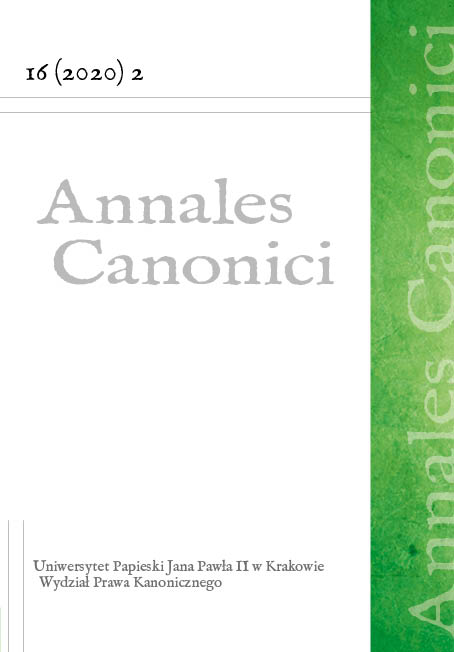Pracownik organu nadrzędnego parafii katolickiej jako jej pełnomocnik procesowy
DOI:
https://doi.org/10.15633/acan.3829Słowa kluczowe:
pełnomocnik sądowy, parafia, diecezja, kuria diecezjalna, postępowanie cywilnoprawneAbstrakt
Zgodnie z polskim prawem regulującym postępowanie sądowe w sprawach cywilnych, strony mogą występować przed sądem poprzez pełnomocników sądowych. Pełnomocnikiem osoby prawnej może być pracownik organu nadrzędnego. Autor artykułu pokazuje, używając argumentów prawnych i teologicznych, że organ nadrzędny parafii katolickiej nie może być utożsamiany z kurią diecezjalną (jak uznał to jeden z sądów powszechnych w Polsce), a nawet nie jest nim diecezja, lecz jedynie biskup diecezjalny. W związku z tym tylko osoba zatrudniona przez biskupa diecezjalnego może reprezentować parafię przed sądami powszechnymi.
Bibliografia
Codex Iuris Canonici auctoritate Ioannis Pauli PP. II promulgatus, 25.01.1983, „Acta Apostolicae Sedis” 75 (1983), pars 2, s. 1–317; tekst łacińsko-polski: Kodeks prawa kanonicznego, przekład zatwierdzony przez Konferencję Episkopatu Polski, Poznań 1984.
Coriden J. A., The Parish in the Catholic Tradition History, Theology and Canon Law, New York–Mahawah 1997.
Kroczek P., The Art of Legislation: the Principles of Lawgiving in the Church, Kraków 20173, s. 118–124.
Ustawa z dnia 17 maja 1989 r. o stosunku Państwa do Kościoła Katolickiego w Rzeczypospolitej Polskiej (Dz. U. z 2019 r. poz. 1347).
Ustawa z dnia 26 czerwca 1974 r. – Kodeks pracy (Dz. U. z 2020 r. poz. 1320).
Ustawa z dnia 17 listopada 1964 r. Kodeks postępowania cywilnego (Dz. U. z 2020 r. poz. 1575).
Wyrok Sądu Okręgowego w Słupsku – I Wydział Cywilny z dnia 29 stycznia 2013 r. (I C 251/11), Legalis nr 2016086.
Pobrania
Opublikowane
Numer
Dział
Licencja
Autorzy publikujący w czasopiśmie udzielają jego wydawcy zgody o następującej treści:
- Autor zachowuje autorskie prawa majątkowe do utworu, a jednocześnie udziela wydawcy czasopisma zgody na jego pierwszą publikację w wersji drukowanej i wersji online na licencji Creative Commons Uznanie autorstwa 4.0 Międzynarodowe oraz zgody na wykonywanie opracowań, w tym przekładów.
- Autor ma możliwość udzielania zgody niewyłącznej na opublikowanie utworu w wersji, która ukazała się w czasopiśmie (np. zamieszczenia go w repozytorium instytucjonalnym lub opublikowania w książce), wraz z informacją o jego pierwszej publikacji w czasopiśmie.
- Autor może umieścić swój utwór online (np. w repozytorium instytucjonalnym lub na swojej stronie internetowej) jeszcze przed zgłoszeniem utworu do czasopisma.

